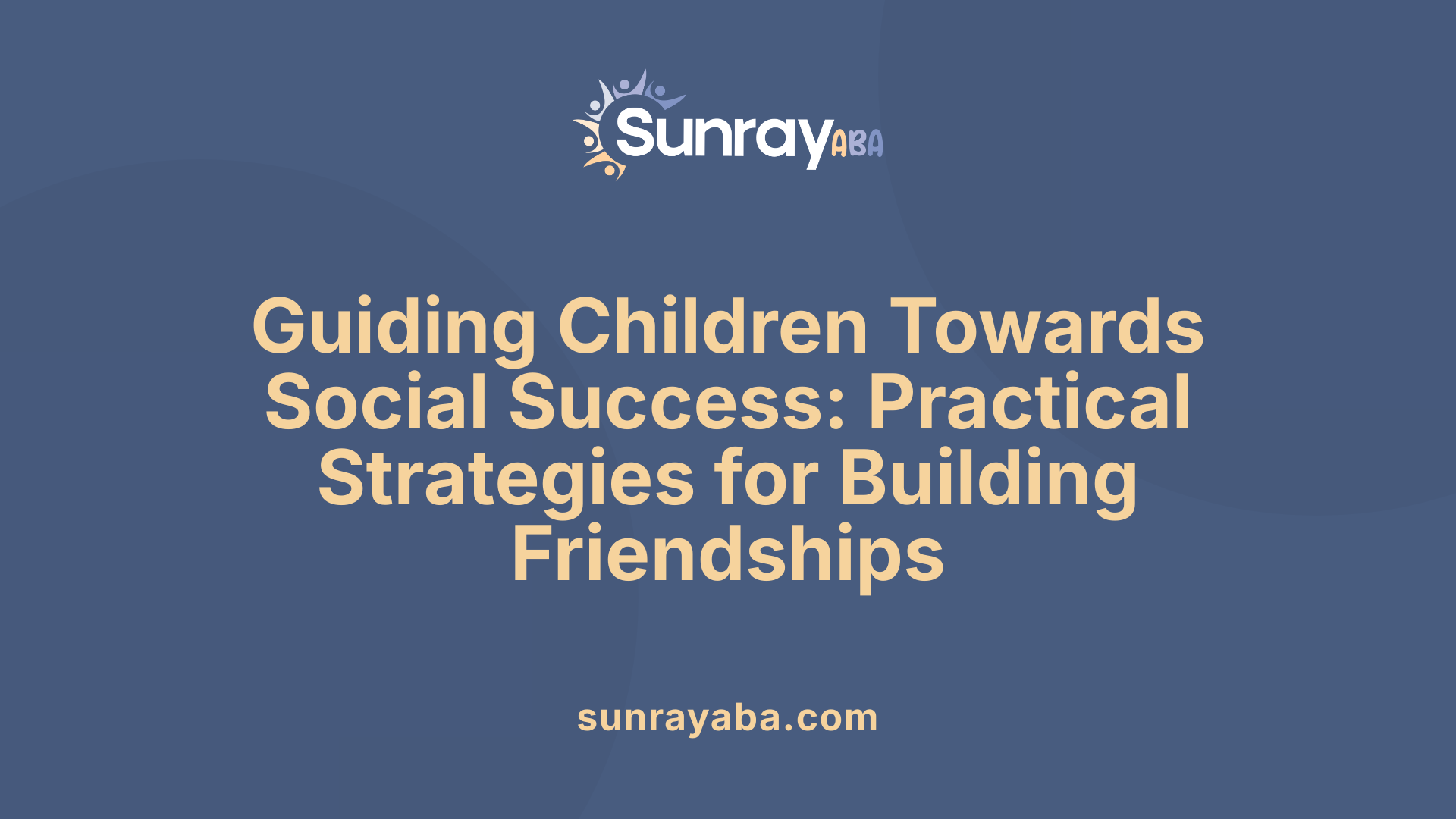Supporting Children In Building Social Friendships

Understanding the Importance of Friendship in Child Development
Building strong social friendships during childhood is a foundational aspect of emotional and social development. Friendships not only offer companionship and fun but also serve as essential platforms for learning vital life skills such as communication, empathy, and conflict resolution. As children navigate different stages of growth, tailored support from parents, educators, and caregivers can significantly enhance their ability to form meaningful and lasting bonds. This article explores the multifaceted ways adults can foster social skills, address challenges, and nurture lifelong friendships for children across various developmental phases.
The Benefits of Friendships in Childhood Development
How do friendships benefit children's emotional, social, and overall well-being?
Friendships play a vital role in shaping children's emotional, social, and overall health. When children form bonds with peers, they gain emotional support and a sense of belonging, which are crucial for their emotional security. Sharing experiences with friends helps children understand their feelings and develop empathy, fostering better emotional regulation.
Socially, friendships teach children essential skills such as communication, cooperation, and conflict resolution. These skills are learned through shared play, conversations, and collaborative activities that promote understanding and respect for others. Strong friendships also boost self-esteem, as children feel accepted and valued, encouraging them to build confidence.
Beyond emotional and social benefits, friendships contribute to mental health by decreasing feelings of loneliness and reducing the risk of depression. They also help children develop resilience and coping mechanisms, preparing them to face life's challenges more effectively.
Research indicates that positive childhood friendships are linked to happier, healthier, and more engaged learners. They foster social competence that supports academic success and social adaptability later in life. Building and maintaining friendships establishes a sturdy foundation for emotional stability, social skills, and long-term well-being, making them essential for healthy development during the formative years.
Supporting Children's Social Development and Friendship Building

How can parents, educators, and caregivers support children's social development and friendship building?
Supporting children's social growth involves creating an environment where they feel safe, loved, and encouraged to interact. Parents, teachers, and caregivers play a vital role in modeling respectful and kind behavior, setting the tone for positive interactions.
Engaging children in a variety of activities helps them practice social skills. Structured activities like role-playing, game sessions, and planned playdates offer opportunities to learn sharing, cooperation, and conflict resolution. Unstructured play outside—whether through sports or open-ended games—further enhances their ability to navigate social cues naturally.
Teaching children about emotions and social cues is crucial. Strategies like active listening, expressing feelings constructively with 'I' messages, and recognizing body language develop their empathy and communication skills. Discussing social stories or characters’ interactions helps children understand different perspectives and boosts their social understanding.
Guidance should include routines and clear expectations that promote consistency and confidence. Reinforcing appropriate behaviors through praise and encouragement encourages resilience and helps children manage social challenges.
By paying attention to individual temperaments, adults can tailor support to each child's needs. This might include extra help during social situations, or activities designed to foster confidence and friendship skills.
Overall, nurturing social skills and friendship-building is an ongoing process. When adults actively support these areas, children develop important capacities that shape their ability to form meaningful, lasting relationships.
The Power of Play in Developing Friendships

How can play and social interactions help children develop friendships?
Play and social interactions are vital tools for children to learn how to form and nurture friendships. As children engage in various types of play—such as solitary play, where they play alone; parallel play, where they play alongside peers without direct interaction; associative play, which involves sharing and taking turns; and cooperative play, where they work together toward common goals—they practice essential social skills.
These interactions allow children to learn how to negotiate, share, and resolve conflicts, building a foundation of trust and emotional connection. Through play, children also develop language skills, understand others' feelings, and learn emotional regulation, all of which are critical for maintaining friendships.
Adults play a supporting role by creating opportunities for children to interact with peers through organized activities, encouraging inclusive play, and modeling respectful and kind behavior. Guiding children through social challenges during play helps them develop resilience and empathy.
Overall, play is more than just fun; it is a natural, effective means for children to build the social and emotional skills necessary for enduring friendships and healthy social development.
Strategies for Helping Children Who Struggle with Friendships
 Helping children who find it difficult to make friends requires a gentle, strategic approach. One effective method is teaching and modeling crucial social skills. Children benefit from learning how to share, ask questions, listen actively, and read social cues. These skills form the foundation for successful interactions and friendships.
Helping children who find it difficult to make friends requires a gentle, strategic approach. One effective method is teaching and modeling crucial social skills. Children benefit from learning how to share, ask questions, listen actively, and read social cues. These skills form the foundation for successful interactions and friendships.
Structured activities can also promote cooperative behavior and empathy. Child-friendly approaches such as social stories, role-playing scenarios, and group activities tailored to their interests offer safe environments for practicing social skills. For instance, participating in clubs or team sports that match the child's interests can help them connect with peers in a relaxed setting.
Building confidence is equally important. Reassure children that making friends is a process and that setbacks or conflicts are part of learning social interaction. Encouraging children to focus on finding a 'tribe' of peers—those who accept and share their interests—rather than forcing friendships with less compatible groups can foster genuine, lasting connections.
Supporting emotional regulation and conflict resolution skills helps children manage common social setbacks. Teaching them to use calming techniques, employ 'I' messages, and resolve disagreements peacefully promotes resilience.
Overall, a combination of skill-building, confidence-shaping, and guided social engagement creates a supportive environment where children can develop meaningful friendships and enjoy social success. Remember, patience and consistency are key in helping children navigate their social world.
Guiding Friendships at Different Educational Stages
 Creating supportive and inclusive environments at every educational stage plays a crucial role in helping children develop strong friendships. From early childhood through adolescence, fostering social participation through well-planned activities encourages children to practice key skills such as sharing, empathy, and conflict resolution.
Creating supportive and inclusive environments at every educational stage plays a crucial role in helping children develop strong friendships. From early childhood through adolescence, fostering social participation through well-planned activities encourages children to practice key skills such as sharing, empathy, and conflict resolution.
During early years, activities like playdates, group projects, and cooperative games promote social bonding and teach children to navigate differences with kindness. As children grow, structured discussions, extracurricular clubs, and team sports offer opportunities for peer interaction that respect diversity and encourage empathy.
In middle and high school, the focus shifts to balancing online communication with face-to-face interactions. Supporting healthy social media habits while encouraging in-person meetups helps teens develop deeper bonds and improve social competence. It is also vital to model positive behaviors such as respectful listening, kindness, and patience.
Parents and educators can foster these skills by creating environments that celebrate diversity and teach children to value differences. Activities that emphasize teamwork and shared goals, like community service projects or cultural exchange programs, promote understanding and respect.
Community involvement also boosts friendship development. Participating in neighborhood events, local clubs, and family activities broadens children's social circles and reinforces community bonds.
Ultimately, environments that prioritize inclusion, model positive social behavior, and support diverse interactions cultivate meaningful friendships. These relationships contribute not only to children’s happiness and confidence but also lay the foundation for their social success as they transition through various educational stages.
Overcoming Challenges in Building Social Relationships
What challenges might children face in building social relationships, and how can they be addressed?
Children can encounter various obstacles in developing meaningful social connections. Common difficulties include social anxiety, which makes it hard for children to approach peers or participate in group activities. Bullying and exclusion are negative experiences that can damage self-esteem and hinder social engagement.
Understanding social cues such as facial expressions, body language, and tone of voice can be complicated for some children, especially those with developmental differences like autism. Low self-confidence and feelings of inadequacy often result in reluctance to seek friendships, further isolating the child.
Addressing these challenges requires a multi-faceted approach. Teaching social-emotional skills—such as empathy, active listening, and cooperation—lays a foundation for healthier interactions. Creating inclusive environments in classrooms and community settings encourages acceptance and minimizes the risk of bullying.
Support services play a vital role in helping children overcome emotional and behavioral barriers. School counselors, social workers, and psychologists can provide targeted interventions, including social skills groups and therapy, to support children dealing with anxiety or aggression.
Parental involvement is crucial; families can foster trust, emotional security, and positive interactions at home. Consistent routines, positive reinforcement, and open communication build confidence and emotional resilience.
Developing secure attachments within the family strengthens a child's ability to trust others. Encouraging children to participate in clubs, sports, or community activities benefits their social skills and broadens their social networks.
Overall, early recognition of social difficulties combined with supportive strategies can significantly improve a child's ability to form and maintain friendships, promoting emotional well-being and social competence.
Fostering Lifelong Friendships and Social Skills
What is the '11-3-6 rule' in friendship, and what does it suggest about building lasting relationships?
The '11-3-6 rule' in friendship is a guideline that highlights the importance of regular, meaningful interactions to develop a strong, lasting bond. It suggests that it typically takes about 11 different encounters, each lasting around three hours, spread over six months to turn an acquaintance into a genuine friendship.
This rule underscores that building trust and deep connections doesn't happen overnight. Instead, it requires consistent effort and shared experiences over time. Each interaction offers an opportunity to learn about each other's interests, values, and personalities, helping to deepen the relationship.
In today’s society, with a 'friendship recession' where social ties may be weaker or more fleeting, such guidelines serve as reminders that cultivating meaningful friendships involves patience and deliberate social engagement.
By understanding and applying the '11-3-6 rule,' both children and adults can approach friendship-building with a practical mindset—knowing that sustained, frequent interactions are key to forming relationships that last a lifetime.
Building trust and loyalty
Trust and loyalty form the foundation of strong, lasting friendships. Children learn to develop these qualities through consistent kindness, honesty, and support. Teachers and parents can foster trust by modeling respectful behavior, encouraging children to share feelings openly, and helping them resolve conflicts calmly.
Understanding friendship types (e.g., Three C’s)
Friendships often fall into categories like casual acquaintances, close friends, or best friends. Recognizing these types helps children appreciate different relationship dynamics. Promoting the 'Three C’s'—closeness, caring, and consistency—guides children in nurturing meaningful attachments.
Long-term relationship development
Building lifelong friendships involves nurturing trust, understanding, and shared experiences over time. Engaging in diverse activities such as sports, creative groups, or community service helps children connect with others who share their interests, fostering bonds that can endure across different life stages.
Contribution of diverse activities
Participation in a variety of activities broadens social horizons. It allows children to meet peers from different backgrounds, learn new skills, and develop empathy. Cooperative and inclusive activities promote teamwork and teach children how to celebrate differences, laying the groundwork for resilient, well-rounded relationships.
See table below for a quick overview:
| Aspect | Description | Impact on Friendship Building |
|---|---|---|
| Building Trust | Consistent, honest interactions | Creates loyalty and emotional safety |
| Friendship Types | Casual, close, best | Clarifies relationship expectations |
| Long-term Development | Shared activities over time | Fosters enduring bonds |
| Diverse Activities | Sports, arts, community | Expands social networks and empathy |
Fostering these elements early helps children develop the social skills needed for meaningful, lifelong friendships, contributing positively to their emotional well-being and overall growth.
Nurturing Social Skills for a Thriving Future
Supporting children's social development is a continuous process that benefits from patience, intentional strategies, and adult guidance. Creating inclusive, engaging environments tailored to various developmental stages helps children learn essential communication, empathy, and conflict resolution skills. Play, role-playing, and structured social opportunities are vital tools in this journey, fostering confidence and genuine relationships. Addressing social challenges proactively and involving family, school, and community in friendship-building efforts ensures children develop resilient, lifelong social skills. Ultimately, nurturing these relationships provides children with a safety net of emotional support and belonging, laying the groundwork for their happiness, well-being, and success in all areas of life.
References
- How educators can support friendships - CELA
- How to help your child make friends | Raising Children Network
- How to help kids navigate friendships and peer relationships
- Caring for Kids - Helping Your Child Build Meaningful Friendships
- Supporting Your Child in Building Friendships Through Play
- Helping Kids Build Inclusive Friendships
- Social Skills: Nurturing Friendships and Healthy Relationships in Kids
- How to support school-age friendships with your children. - MIND 24-7
- Social Connection On Child Development - Children's Bureau
- How to Foster Healthy Friendships and Social Skills in Children